Low Blood Pressure: Signs, Symptoms, and Causes

What Is Low Blood Pressure?
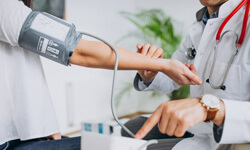 Blood pressure is the force exerted by your blood against the walls of the blood vessels. Your blood pressure is expressed as systolic/diastolic blood pressure, where the systolic blood pressure represents the pressure generated by the muscle of the heart contracting and pumping blood into the arteries. The diastolic blood pressure represents the pressure in the arteries as the muscle of the heart relaxes post contraction.
Blood pressure is the force exerted by your blood against the walls of the blood vessels. Your blood pressure is expressed as systolic/diastolic blood pressure, where the systolic blood pressure represents the pressure generated by the muscle of the heart contracting and pumping blood into the arteries. The diastolic blood pressure represents the pressure in the arteries as the muscle of the heart relaxes post contraction.
Blood pressure is always higher when the heart is contracting than when it is relaxing. Normal systolic blood pressure ranges between 90 and 120 mm Hg. Normal diastolic blood pressure falls between 60 and 80 mm Hg.
An optimal blood pressure level is a reading lower than 120/80 mm Hg. A high blood pressure level indicates a reading over 140/90 mm Hg. Unlike high blood pressure, low blood pressure is diagnosed by the signs and symptoms of a low blood flow rather than a specific blood pressure level.
If your blood pressure level is low and yet you show no signs or symptoms, it means you do not have low blood pressure. On the other hand, if you develop symptoms, it is an indication of low blood pressure or hypotension. Basically, low blood pressure is when the flow of blood is too low to deliver enough oxygen and nutrients to vital organs such as the brain, heart, and kidney. In this scenario, the organs cannot function normally and may be temporarily or permanently damaged.
Let’s take a closer look at the symptoms to identify if you have low blood pressure.
What are the signs and symptoms of low blood pressure?
SYMPTOMS OF LOW BLOOD PRESSURE

Light-headedness

Dizziness

Fainting

Blurred Vision

Nausea

Loss of Concentration

Fatigue

Clammy, Cold, Pale Skin

Confusion

Rapid, Shallow Breathing
What are the complications arising from low blood pressure?
COMPLICATIONS RESULTING FROM LOW BLOOD PRESSURE
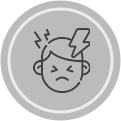
Persistently low blood pressure can send your body into a state of life-threatening shock that eventually results in the rapid failure of your organs such as the kidneys, liver, heart, lungs, and brain.
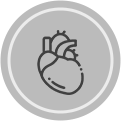
If the blood pressure is too low to deliver blood to the coronary arteries that supply blood to the heart, you may suffer from chest pain or even a heart attack.
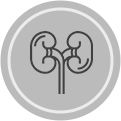
If inadequate blood is delivered to the kidneys, the kidneys fail to eliminate wastes, such as, urea (BUN and creatinine) from the body, resulting in a simultaneous increase in their levels in the blood.
What are the causes of low blood pressure?
Some medical conditions can cause low blood pressure, including:
-
Pregnancy
 Blood pressure may drop during pregnancy as the circulatory system expands rapidly. The blood pressure usually returns to the pre-pregnancy level post-birth.
Blood pressure may drop during pregnancy as the circulatory system expands rapidly. The blood pressure usually returns to the pre-pregnancy level post-birth. -
Heart Problems
 An extremely low heart rate (bradycardia), heart valve problems, a heart attack and heart failure can cause low blood pressure.
An extremely low heart rate (bradycardia), heart valve problems, a heart attack and heart failure can cause low blood pressure. -
Endocrine Disorders
 Thyroid conditions such as parathyroid disease, adrenal insufficiency (Addison’s disease), low blood sugar (hypoglycemia) and, in some cases, diabetes can contribute to low blood pressure.
Thyroid conditions such as parathyroid disease, adrenal insufficiency (Addison’s disease), low blood sugar (hypoglycemia) and, in some cases, diabetes can contribute to low blood pressure. -
Dehydration
 Fever, vomiting, severe diarrhoea, overuse of diuretics and physical overexertion can cause dehydration. Dehydration can lead to weakness, dizziness and fatigue.
Fever, vomiting, severe diarrhoea, overuse of diuretics and physical overexertion can cause dehydration. Dehydration can lead to weakness, dizziness and fatigue. -
Blood Loss
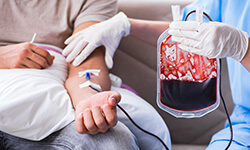 Blood loss from a major injury or internal bleeding, reduces the amount of blood in your body, leading to fall in blood pressure levels.
Blood loss from a major injury or internal bleeding, reduces the amount of blood in your body, leading to fall in blood pressure levels. -
Severe Infection (Septicemia)
 When an infection in the body enters the bloodstream, it can cause a lethal drop in blood pressure and send your body into a septic shock.
When an infection in the body enters the bloodstream, it can cause a lethal drop in blood pressure and send your body into a septic shock. -
Severe Allergic Reaction (Anaphylaxis)
 Certain foods, medications, insect venoms and latex can trigger an allergic reaction (anaphylaxis) that can result in breathing problems, hives, itching, a swollen throat and a deadly drop in blood pressure.
Certain foods, medications, insect venoms and latex can trigger an allergic reaction (anaphylaxis) that can result in breathing problems, hives, itching, a swollen throat and a deadly drop in blood pressure. -
Nutrient Deficiency
 A deficiency of vitamins B-12 and folate in the body can result in anaemia and low blood pressure.
A deficiency of vitamins B-12 and folate in the body can result in anaemia and low blood pressure.
A few medications that can cause low blood pressure, include:
- Diuretics
- Alpha blockers
- Beta blockers
- Drugs for Parkinson’s disease
- Antidepressants
- Drugs for erectile dysfunction
When should you be worried about low blood pressure?
 Did you know that people with lower blood pressures have a lower risk of suffering a stroke, kidney disease, and heart disease? Most athletes, non-smokers, and people who maintain an ideal weight and exercise regularly have lower blood pressures. On that note, low blood pressure is only a cause for worry if it drops low enough to cause the above symptoms and lead to the damage of your vital organs.
Did you know that people with lower blood pressures have a lower risk of suffering a stroke, kidney disease, and heart disease? Most athletes, non-smokers, and people who maintain an ideal weight and exercise regularly have lower blood pressures. On that note, low blood pressure is only a cause for worry if it drops low enough to cause the above symptoms and lead to the damage of your vital organs.
If you experience any signs or problems along with a lower-than-normal reading of your blood pressure level, do consult your doctor at once.
The first step to diagnosing low blood pressure is to measure your blood pressure in both the lying (supine) and standing positions. Often times, there is a drop in blood pressure upon standing, as gravity causes blood to settle in the legs and less blood returns to the heart. When you visit your doctor for an accurate diagnosis, keep a record of your symptoms and activities at the time they took place.
If you’d like to go through more such healthcare articles on hypertension or hypotension, or if you wish to book an appointment with an experienced practitioner, check.
Note of caution: This article is for information purpose only. Always consult your doctor in case of any blood pressure or other health related problems.

Comments (4)
Sana
An interesting read!
Kinjal
Had no clue dehydration can cause low BP. Thank you guys for sharing this.
Nilesh
Good content, really insightful.
Aayushi
Very insightful blog indeed. It’s actually a bit tricky to find reliable info on low blood pressure. So this is useful.
Add your comment